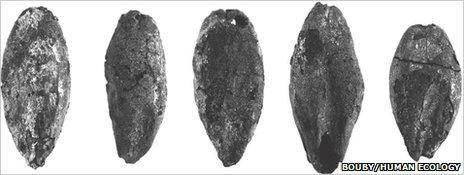Iron-Age brewing evidence found in southeastern France
- Published

The carbonised barley grains suggest they were "malted" and then roasted
Archaeologists have uncovered evidence that the occupants of southeastern France were brewing beer during the Iron Age, some 2,500 years ago.
A outlines the discovery of barley grains that had been sprouted in a process known as malting; an oven found nearby may have been used to regulate the process.
Beer brewing's heritage stretches back to the Bronze Age in China and the Middle East, but this is the earliest sign of the practice in France, where wine-making had already taken hold.
The recent find was in Roquepertuse, close to modern Aix-en-Provence, and was excavated in the 1990s.
Archaeologist Laurent Bouby from France's National Centre for Scientific Research has been studying "archaeobotany" - preserved plant remains - in the region around Roquepertuse for more than a decade.
Wine not
Dr Bouby and his colleagues have now analysed the "macrobotanical" remains found at three sites during those digs: a paved floor near an oven and hearth of a home dated to the 5th Century BC, and a ceramic vessel and a pit that were near storage containers.
Ninety percent of the barley grains that were recovered from these locations had been induced to sprout.
The malted grains and the arrangement of the finds led the team to surmise a "home-brew" scenario, which they note requires no specialised equipment.
"All that is needed is an amount of grain, some water, containers (commonly pottery vessels) in which to soak the grain, a flat paved area - possibly the floor - to spread out and turn the grain during germination, an oven to dry it in order to stop germination, domestic grindstones to grind the malted grain, hearths and again containers for fermentation and storage," they wrote.
"Evidence for all of these sorts of equipment is reported from the Roquepertuse dwelling."
Prior studies suggest that a variant of the barley plant known as six-row barley was the primary cultivated plant in the region at the time; the authors of the study now suggest that beer production may have been one of the principal reasons for this.
- Published8 February 2011